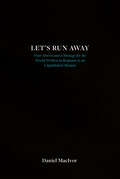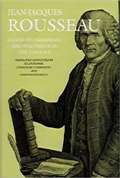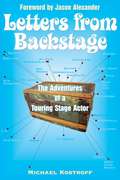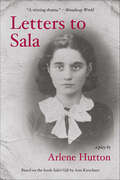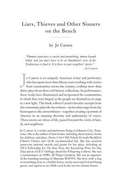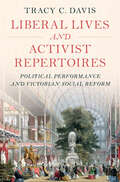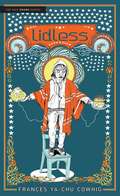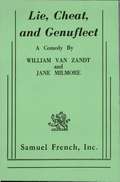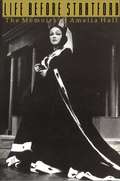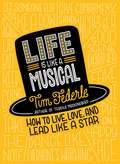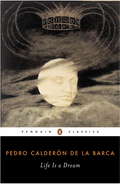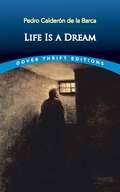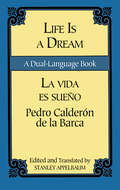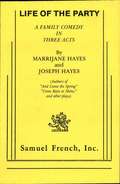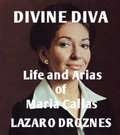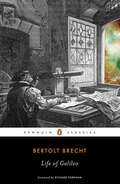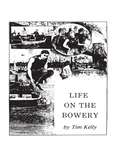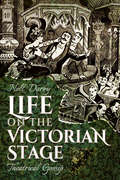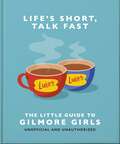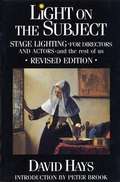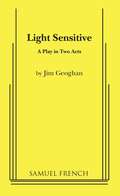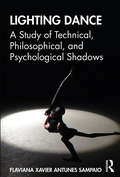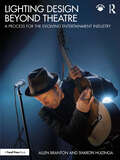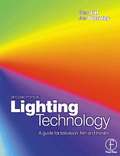- Table View
- List View
Let's Run Away
by Daniel MacIvorPeter is putting on a show. He’s a bit stressed. In the show, he will read from a manuscript. It’s a large manuscript, but don’t worry, he’s only going to read the parts about him, and there aren’t many. It’s a memoir written by someone who abandoned him twice—once as a baby and once when he was a young man of thirteen. This person has figured prominently in Peter’s life for over fifty years now, but judging by the memoir, he has not figured so much in theirs. So perhaps it’s going to be a very short show? Again, don’t worry, Peter has other skills which he will share. And if Peter can keep his cool, and if the people who work at the theatre can help him set everything up, and if the audience can just give him a little bit of their time and their attention and their silence, maybe he can tell everyone something about who we really are and who we are to others and who we might be to ourselves when we’re alone. And maybe that can make it all a little bit easier.
Letter To D'Alembert And Writings For The Theater (The Collected Writings of Rousseau Volume #10)
by Jean-Jacques Rousseau Christopher Kelly Allan Bloom Charles ButterworthIn 1758, Jean Le Rond d'Alembert proposed the public establishment of a theater in Geneva--and Jean-Jacques Rousseau vigorously objected. Their exchange, collected in volume ten of this acclaimed series, offers a classic debate over the political importance of the arts. As these two leading figures of the Enlightenment argue about censorship, popular versus high culture, and the proper role of women in society, their dispute signals a declaration of war that divided the Enlightenment into contending factions. These two thinkers confront the contentious issues surrounding public support for the arts through d'Alembert's original proposal, Rousseau's attack, and the first English translation of d'Alembert's response as well as correspondence relating to the exchange. The volume also contains Rousseau's own writings for the theater, including plays and libretti for operas, most of which have never been translated into English. Among them, Le Devin du village was the most popular French opera of the eighteenth century while his late work Pygmalion is a profound meditation on the relation between an artist and his creation. This volume offers English readers a unique opportunity to appreciate Rousseau's writings for the theater as well as his attack on the theater as a public institution.
Letters from Backstage: The Adventures of a Touring Stage Actor
by Jason Alexander Michael KostroffEver wonder what it's like to be a real working actor? Wonder no more! Michael Kostroff is here to reveal, in hilarious detail, just what it's like to travel with the road companies of The Producers and Les Miserables. His firsthand account of the exciting, funny, and sometimes bizarre highlights of his journey includes working at a temp job when his agent calls to say, "You got the part!"; singing on a revolving stage while lugging a dead body; seeing ghosts in haunted theaters; and much more. Along the way, anecdotes about nailing an audition, keeping a performance fresh, and getting along with fellow cast members give useful tips for working actors. Anyone who wants to know what a life in the theater is really like needs this intimate and unforgettable narrative.
Letters to Sala: A Play
by Arlene Hutton&“A stirring drama&” (Broadway World) adapted by award-winning playwright Arlene Hutton from the book Sala&’s Gift by Ann Kirschner, Letters to Salais a remarkable play about a young girl&’s personal and emotional Holocaust journey. Sala Garncarz, daughter of a rabbi and the youngest of 11 children, was 16 in 1940 when she volunteered to take her sister&’s place in a Nazi work camp. Over the next five years, she endured seven camps and collected, at great risk to herself, a cache of more than 350 letters, postcards, photographs, and other documents sent to her and others during that time. Sala survived the war and moved to America, where, more than 50 years later, she and her family donated her remarkable collection of letters and documents to the New York Public Library, where it went on to earn wide attention. Through these letters that Sala managed to hide and keep safe, Letters to Sala tells the story of her experiences and those of others in the web of Nazi labor camps in occupied Europe, a less-documented and less-familiar aspect of the Holocaust. Letters to Sala has been produced off-Broadway at the Barrow Group and with more than 100 productions. This book includes photos, letters, and introductions by the playwright and by Sala&’s daughter Ann Kirschner.
Liars, Thieves and Other Sinners on the Bench
by Jo Carson"Haunting and funny, full of folk wisdom and unfl inching honesty."--Publishers Weekly, on the work of Jo Carson"She is a quintessential community artist with a true ear for the way people talk and what they really mean to say. Her work has inspired innumerable young artists to take up work with their own communities."--Linda Frye Burnham, Community Arts Network"Human experience is varied and astonishing," notes Jo Carson, "and this is a taste." A uniquely American writer and performer, Carson has spent fifteen years working with peoples' stories in communities across the country, crafting more than thirty plays from the oral histories she has collected. In performance, these works have illuminated and invigorated the communities in which they were forged, as the people see themselves onstage in a new light. This book collects Carson's favorite excerpts from the plays--stories that range from the homespun to the extraordinary and together create a portrait of America in an amazing diversity and authenticity of voices. They are slices of life, passed beyond the circle of family and neighbors.Jo Carson is a writer and performer living in John City, Tennessee. She has published award-winning plays, short stories, children's books, essays, poems, and other work, and for years was a commentator on National Public Radio's All Things Considered. Her play Whispering to Horses and solo show If God Came Down . . . premiered at Seven Stages Theatre in Atlanta, and her book of monologues and dialogues, Stories I Ain't Told Nobody Yet, made Booklist's editor's choice and the American Library Association's recommended list.
Liberal Lives and Activist Repertoires: Political Performance and Victorian Social Reform
by Tracy C. DavisThis ambitious study traces the strategies of human rights activists to show how world-changing reform movements were shaped by women and men from modest backgrounds who were deeply attuned to the power of performance. Tracy C. Davis explores nineteenth-century reform campaigns through the pioneering work of a family of activists – prominent anti-slavery lecturer George Thompson, his daughter Amelia (the first female theatre and music critic for a British daily newspaper) and her husband, the political organizer Frederick Chesson. Engaging in some of the most important social struggles of the late Georgian and Victorian periods – including abolition, enfranchisement, and anti-genocide - this book reveals how two generations' insights into performance consolidated into activist tactics that persist today. Characterised by a skilful deployment of performance theory alongside deep and wide-ranging historical knowledge, this ground-breaking work demonstrates what 'dramaturgy' can teach us about 'history'.
Lidless
by Frances Ya-Chu CowhigLidless is a work of extraordinary intelligence and finely-balanced sensibility. It marries the implacable logic of a Greek tragedy with an all-too-modern setting. It's been fifteen years since Guantanamo, fifteen years since Bashir last saw his U.S. Army interrogator, Alice. Bashir is now dying of a disease of the liver, an organ that he believes is the home of the soul. He tracks down Alice in Texas and demands that she donate half her liver as restitution for the damage wrought during her interrogations. But Alice doesn't remember Bashir; a PTSD pill trial she participated in while in the army has left her without any memory of her time there. It is only when her inquisitive fourteen-year-old daughter begins her own investigation that the fragile peace of mind that Alice's drug-induced oblivion enabled begins to falter. Frances Ya-Chu Cowhig's powerful drama asks important and difficult questions: is guilt a necessary form of moral reckoning, or is it an obstacle to be overcome? Will the price of national political amnesia be paid only by the next generation - the daughters and sons who were never there? Although politically engaged and topical, the play's significance is further-reaching and taps into timeless questions. Lidless portrays the inevitable consequences of moral crimes, in spite of the lapse of time and the oblivion of the perpetrators. Guilt inexorably engenders retribution with a horrible symmetry, so comeuppance is exacted upon what is held most dear. Within a modern and politically-charged setting, Lidless has a tight plot of cyclical, interfamilial violence and inevitable, if blindly executed, vengeance.
Lie, Cheat, And Genuflect
by Jane Milmore Billy Van ZandtComedy / 4m, 4f / Interior / The Buckle brothers, Billy and Tom, are in big trouble: Tom's infallible eye for slow horses has drained away all of Billy's savings and he has borrowed from loan shark Pizza Face Petrillo, who now wants his money back or else! There's plenty of money in grandfather Buckle's will, but these two black sheep are pretty sure they'll never see any of that. What else to do but dress Billy up as a nun and have him pose as their cousin who is to inherit the entire fortune? Involve a stuffy young lawyer, a hard drinking, man hungry housekeeper and a trio of beautiful young women, and you have the recipe for a laugh packed farce of twists, turns, puns and pratfalls as Tom strives mightily to compensate for Billy's "habitual" errors.
Life Before Stratford: The Memoirs of Amelia Hall
by Diane Mew Amelia HallBy the time Amelia Hall died suddenly in December 1984 she had become one of Canada’s most respected and well-loved actresses. In this book she has left an incomparable record of her early years in the professional theatre in Canada. In particular, these memoirs chronicle the history of the Canadian Repertory Theatre of Ottawa, one of the first professional repertory theatres in Canada. Under Amelia Hall’s direction in the late forties and early fifties, the CRT gave a start to the careers of such notable Canadian actors as Christopher Plummer, Eric House, William Hutt, Ted Follows and William Shatner. In these days of long-running corporate subsidized extravaganzas, it is instructive to read of the struggles and accomplishments of these pioneers of theatre in Canada, performing weekly repertory on a shoestring budget, with few facilities adn minuscule salaries. Yet it was these enthusiasts who provided the basis for the flowering of the Canadian theatrical scene in the 1960s and 1970s. It is appropriate that these memoirs should culminate in Amelia Hall’s portrayal of the Lady Anne in Richard III opposite Alec Guinness at the first Stratford Festival in 1953, making her the first Canadian and the first woman to speak on the Stratford stage. This book is lavishly illustrated with photographs from Amelia Hall’s personal collection, now housed at the National Archives of Canada.
Life Is Like a Musical: How to Live, Love, and Lead Like a Star
by Tim FederleA Self-Help Guide--with Jazz Hands! Life is Like a Musical features 50 wry, witty tips on getting ahead in life and love--all learned in the showbiz trenches. "Hilarious, wise, and one-of-a-kind. This book is so damn brilliant I'm surprised it didn't already exist." -- Sarah Knight, bestselling author of The Life-Changing Magic of Not Giving a F*ck Before Tim Federle became a bestselling author and a Broadway playwright, he worked as a back-up dancer at the Super Bowl, a polar bear at Radio City, and a card-carrying chorus boy on Broadway. Life is Life a Musical features 50 tips learned backstage, onstage, and in between gigs, with chapters such as "Dance Like Everyone's Watching" and "Save the Drama for the Stage." This charming and clever guide will appeal to all ages and inspire readers to step into the lead role of their own life, even if they're not a recovering theater major.
Life Is a Dream
by Gregary Racz Pedro Calderon de la BarcaThe masterwork of Spain's preeminent dramatist--now in a new verse translation Life Is a Dream is a work many hold to be the supreme example of Spanish Golden Age drama. Imbued with highly poetic language and humanist ideals, it is an allegory that considers contending themes of free will and predestination, illusion and reality, played out against the backdrop of court intrigue and the restoration of personal honor. In the mountainous barrens of Poland, the rightful heir to the kingdom has been imprisoned since birth in an attempt by his father to thwart fate. Meanwhile, a noblewoman arrives to seek revenge against the man who deceived and forsook her love for the prospect of becoming king of Poland. Richly symbolic and metaphorical, Life Is a Dream explores the deepest mysteries of human experience.
Life Is a Dream (Dover Thrift Editions: Plays)
by Pedro Calderón de la BarcaConsidered one of the outstanding Spanish dramas of all time, this 17th-century allegory explores the mysteries of human destiny, the illusory nature of existence, and the struggle between predestination and free will. On the basic plot structure of king's suspicions of his son's role in an impending revolution, the playwright builds a dramatic edifice of theatricality, rich in symbolism and metaphor, expressed in magnificent poetry. This edition presents an excellent new English translation, with an informative introduction and footnotes.
Life Is a Dream/La Vida es Sueño: A Dual-Language Book (Dover Dual Language Spanish)
by Pedro Calderon de la BarcaThe most famous of all Calderon's varied and romantic dramas, this seventeenth-century masterpiece by the great Spanish playwright explores the conflict between free will and predestination as it focuses on the life of Segismundo, a Polish prince imprisoned at birth by his father, the King. The monarch's heartless action, precipitated by astrologers who predict the boy will one day usurp the throne, paves the way for a series of events that turn the son against the father and lead to rebellion. Years later, following a revolution and the peasants' seizure of power, the grim prophecy uttered at the Prince's birth threatens to become a painful reality. For this edition, Stanley Appelbaum has written an informative introduction and an excellent new literal translation that appears on pages facing the Spanish original. A valuable text for students of Spanish language and literature, this volume will delight any reader interested in classics from Spain's Golden Age of drama.
Life Of the Party
by Marrijane HayesComedy / 7m, 10f / Interior / The Hughes family moves to Butterfield and begins to choose friends. Mr. Hughes is there on business. Mrs. Hughes has social ambitions. Oldest daughter Mildred fancies herself in love with the snooty son of a bank president. Studious daughter Jean flings off her glasses and becomes the life of the party. Dapper Teddy gets into a merry mix up juggling four dates at once. And daughter Amy falls in love for the first time. But the whole family is in for a hard awakening. They all become aware of the serious implications of what had seemed very funny and make wise readjustments to one another and to life.
Life and Arias of María Callas
by Lázaro Droznes Pablo BarrantesLife and arias from María Callas María Callas was probably the greatest soprano of "bel canto". Her life, filled with many ups and downs, can only be compared to the lives of the tragic heroines she used to represent in her scenes. Her trajectory largely exceeded the theatre lyric limits when she became a diva that attracted the interest of the masses, and an international "jet set" star. The play, narrated in first-person by the Diva, portrays the main instances of her tumultuous life, alternated with her most famous arias, which serve to illustrate and foreshadow her tragic fate.
Life of Galileo (Penguin Classics)
by Ralph Manheim Bertolt Brecht John WillettGalileo ranks alongside Mother Courage and Mr. Puntila as one of Brecht's most intensely alive, human, and complex characters. In Life of Galileo, the great Renaissance scientist is in a brutal struggle for freedom from authoritarian dogma. Unable to satisfy his appetite for scientific investigation, he comes into conflict with the Inquisition and must publicly renounce his theories, though in private he goes on working on his revolutionary ideas.
Life on the Bowery of the Liar's Doom
by Tim KellyComic melodrama / 8m, 10f, optional extras / Simple staging / Based on Robert Neilson Stephens' On the Bowery, this stage success depicts wild and wicked deeds. This version is easy to rehearse and produce, but misses none of the fun and thrills. Mrs. Drayton wishes her daughter Alice to marry villainous Thurlow Bleekman but she loves reporter Jack Hobart. The Drayton mansion is robbed and Bleekman blames Jack, forcing him to prowl the Bowery dressed as a Chinese waiter amid the riff raf who congregate at Brody's. Meanwhile, Bleekman's girlfriend threatens to reveal his true character if he does not marry her. In the play's funniest scene the villain engages burglars to toss the troublesome girl from the Brooklyn Bridge. The villain meets his liar's doom, Jack and Alice marry, and a lost daughter and mother are reunited while the laughter rolls on. Optional olio acts can add to the hilarity. "Entertaining ... theatre rocked with good natured laughter" Hollywood Ledger .
Life on the Victorian Stage: Theatrical Gossip
by Nell DarbyThe expansion of the press in Victorian Britain meant more pages to be filled, and more stories to be found. Life on the Victorian Stage: Theatrical Gossip looks at how the everyday lives of Victorian performers and managers were used for such a purpose, with the British newspapers covering the good, the bad and the ugly side of life on the stage during the nineteenth century. Viewed through the prism of Victorian newspapers, and in particular through their gossip columns, this book looks at the perils facing actors from financial disasters or insecurity to stalking, from libel cases to criminal trials and offers an alternative view of the Victorian theatrical profession.This thoroughly researched and entertaining study looks at how the Victorian press covered the theatrical profession and, in particular, how it covered the misfortunes actors faced. It shows how the development of gossip columns and papers specializing in theater coverage enabled fans to gain an insight into their favorite performers lives that broke down the public-private divide of the stage and helped to create a very modern celebrity culture.The book looks at how technological developments enabled the press to expose the behavior of actors overseas, such as when actor Fred Solomon's' bigamy in America was revealed. It looks at the pressures facing actors, which could lead to suicide, and the impact of the 1857 Matrimonial Causes Act on what the newspapers covered, with theatrical divorce cases coming to form a significant part of their coverage in the latter half of the nineteenth century. Other major events, from theater disasters to the murder of actor William Terriss, are explored within the context of press reportage and its impact. The lives of those in the theatrical profession are put into their wider social context to explore how they lived, and how they were perceived by press and public in Victorian Britain.
Life's Short, Talk Fast: The Little Guide to Gilmore Girls
by Orange Hippo!Almost 25 years have passed since Gilmore Girls first hit our TV screens, but the iconic show continues to captivate audiences with its warmth, humor, and irresistible storytelling. Celebrated for its loveable cast of characters and relatable moments, the series has explored the complexities of family, friendship and the pursuit of dreams and has been described as one of the greatest television shows of all time.This pocket-sized companion will transport readers into the whimsical world of mum-and-daughter duo Lorelai and Rory, and the beloved residents of Stars Hollow - a place where the coffee flows endlessly and witty banter is a way of life. From Lorelai's lightning-fast comebacks to Rory's insightful musings, the pages are crammed with the delightful dialogue and memorable lines that made the Gilmore Girls series so cherished, while behind-the-scenes stories and fascinating tidbits will satisfy even the most devoted fan. "Oy with the poodles already!" Lorelai's exclamation in the first episode, expressing her frustration, became an iconic line."I can't stop eating. I eat because I'm unhappy, and I'm unhappy because I eat. It's a vicious cycle." A classic Lorelai moment, highlighting her humour and love for food."A cheeseburger, onion rings, and a list of people who killed their parents and got away with it. I'm looking for heroes." The unforgettable line when Lorelai storms into the diner and shouts her order."Trig, I can do. But boys and dating, forget it."Rory reflecting on her love life.
Life's Short, Talk Fast: The Little Guide to Gilmore Girls
by Orange Hippo!Almost 25 years have passed since Gilmore Girls first hit our TV screens, but the iconic show continues to captivate audiences with its warmth, humor, and irresistible storytelling. Celebrated for its loveable cast of characters and relatable moments, the series has explored the complexities of family, friendship and the pursuit of dreams and has been described as one of the greatest television shows of all time.This pocket-sized companion will transport readers into the whimsical world of mum-and-daughter duo Lorelai and Rory, and the beloved residents of Stars Hollow - a place where the coffee flows endlessly and witty banter is a way of life. From Lorelai's lightning-fast comebacks to Rory's insightful musings, the pages are crammed with the delightful dialogue and memorable lines that made the Gilmore Girls series so cherished, while behind-the-scenes stories and fascinating tidbits will satisfy even the most devoted fan. "Oy with the poodles already!" Lorelai's exclamation in the first episode, expressing her frustration, became an iconic line."I can't stop eating. I eat because I'm unhappy, and I'm unhappy because I eat. It's a vicious cycle." A classic Lorelai moment, highlighting her humour and love for food."A cheeseburger, onion rings, and a list of people who killed their parents and got away with it. I'm looking for heroes." The unforgettable line when Lorelai storms into the diner and shouts her order."Trig, I can do. But boys and dating, forget it."Rory reflecting on her love life.
Light On The Subject: Stage Lighting For Directors And Actors - And The Rest Of Us
by David HaysThe aim of this book is to demystify the technology of stage lighting, and it does so by uniting its text with quotations from literature, thus setting a common ground for the perception and understanding of light, in our daily lives as well as on stage.
Light Sensitive
by Jim GeoghanDramatic Comedy. . Characters: 2 male, 1 female. Interior Set. Thomas Hanratty, lifelong resident of Hell's Kitchen and once the most dangerous white cab driver in New York, was blinded eight years ago in a drunken accident and is fading into a routine of self pity and alcohol. His bartender and only friend, who was partly responsible for the accident, is moving to Vermont with a new lady friend, but he can't abandon Tom. He recruits an unattractive, slightly handicapped volunteer reader from the Lighthouse who battles her way through Tom's shell. By the second act, they are falling in love. His buddy returns with tales of his "Christmas from hell" in Vermont, and doubt arises as to who will hold the number one position in Tom's life. . "Geoghan brings his characters to life and the audience to its feet cheering." -The Los Angeles Times
Lighting Dance: A Study of Technical, Philosophical, and Psychological Shadows
by Flaviana Xavier SampaioLighting Dance pioneers the discussion of the ability of lighting design to foreground shadow in dance performances. Through a series of experiments integrating light, shadow, and improvised dance movement, it highlights and analyses what it advances as an innovative expression of shadow in dance as an alternative to more conventional approaches to lighting design. Different art forms, such as painting, film, and dance pieces from Loie Fuller, the Russell Maliphant Dance Company, Elevenplay, Pilobolus, and the Tao Dance Theater served to inspire and contextualise the study. From lighting to psychology, from reviews to academic books, shadows are examined as a symbolic and manipulative entity. The book also presents the dance solo Sombreiro, which was created to echo the experiments with light, shadow, and movement aligned to an interpretation of cultural shadow (Jung 1954, in Samuels, Shorter, and Plaut 1986; Casement 2006; Ramos 2004; Stein 2004; and others). The historical development of lighting within dance practices is also outlined, providing a valuable resource for lighting designers, dance practitioners, and theatre goers interested in the visuality of dance performances.
Lighting Design Beyond Theatre: A Process for the Evolving Entertainment Industry
by Allen Branton Sharon HuizingaLighting Design Beyond Theatre provides a step-by-step design process for live event lighting outside of traditional theatre, dance, and opera, including concerts and tours, awards shows, sporting events, benefits, comedy shows, corporate events, fashion shows, political events, and more.This book introduces the origins and history of live events, establishes a shared practice for lighting designers working in live event design, compares and contrasts where lighting design process for theatre, dance, and opera differs from lighting design process for live events, and provides practical considerations and wisdom about navigating the work culture of these events. Containing case studies and exercises, the book outlines holistic processes and practices for this career, including building a task list, choosing equipment, incorporating constructive feedback, leadership, the realities of money and client relations, and getting invited back for more job opportunities.This book is written for students of lighting design and emerging lighting designers interested in exploring lighting design outside the traditional theatre industry, as well as instructors teaching lighting design for nontheatrical live events.Lighting Design Beyond Theatre includes access to downloadable materials for instructors and readers to use as a project, following along with the exercises in the book. These materials represent the information available at various steps in a design process for a realized show, from venue and site information to scenic renderings and schedule details. The final light plot and production photos are also included.
Lighting Technology: A Guide For The Entertainment Industry
by Brian Fitt Joe ThornleyAnyone working with lighting in the entertainment industries will find this an immensely readable source of information. The authors, themselves experienced lighting practitioners, have collected a wealth of essential lighting technology and data into one comprehensive reference volume in an accessible, jargon-free style. The new edition of this popular text covers the very latest technology, including advances in lamps, motorised lights, dimmers and control systems and current safety regulations.
